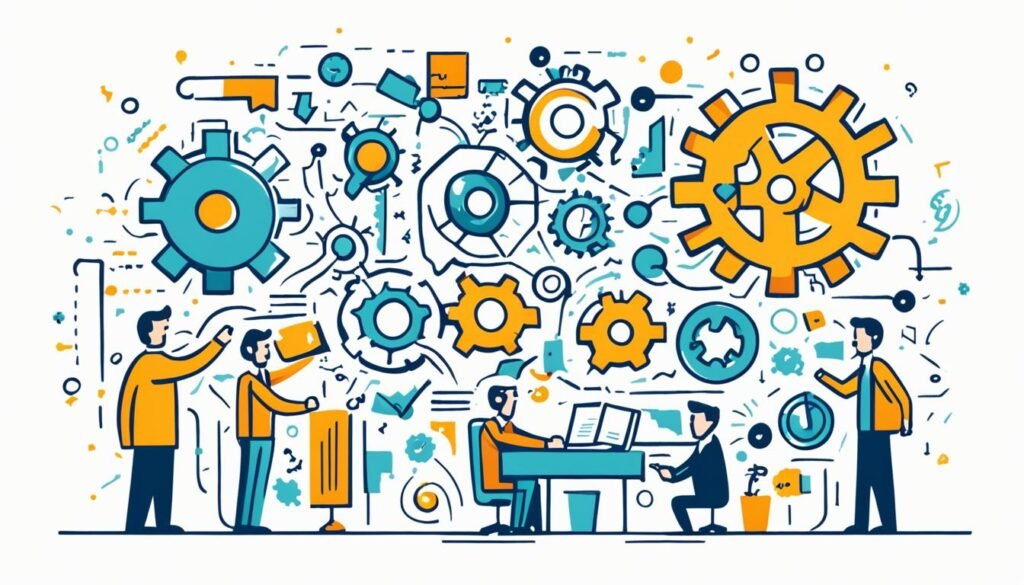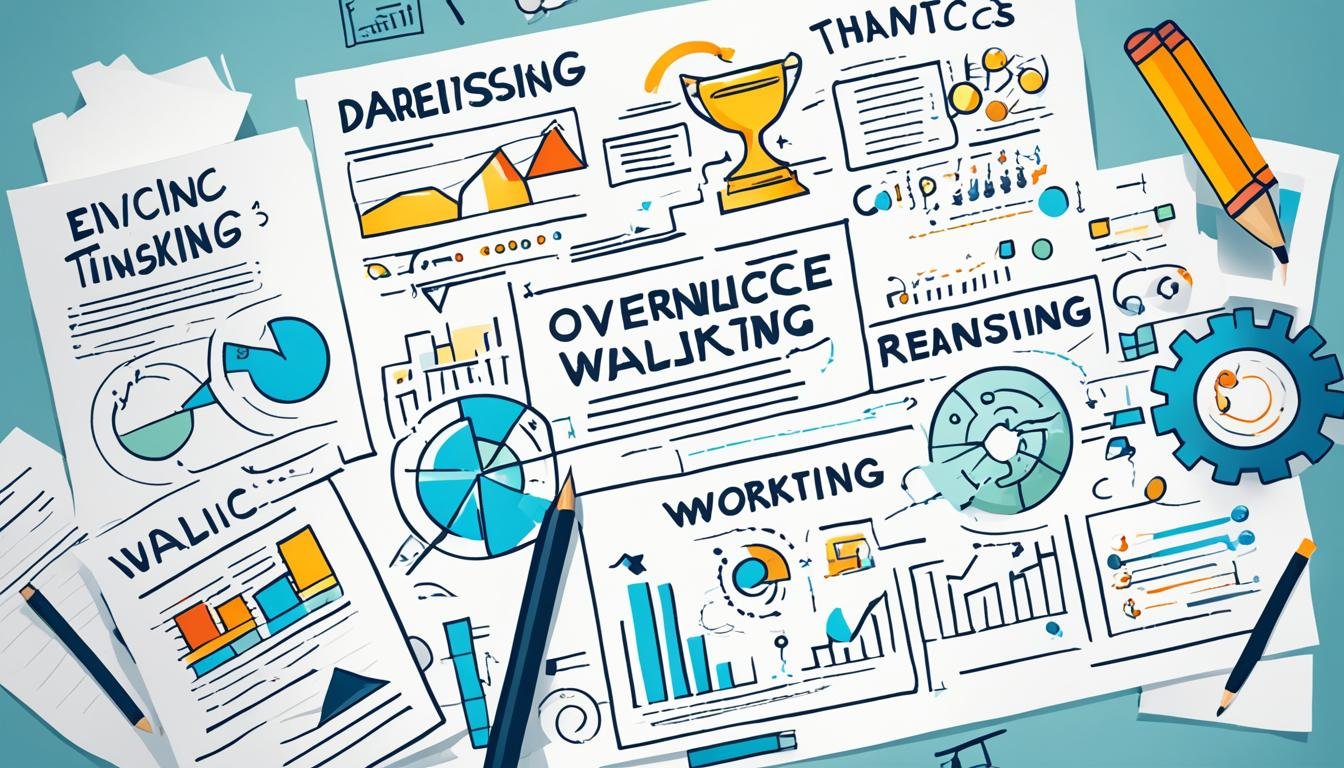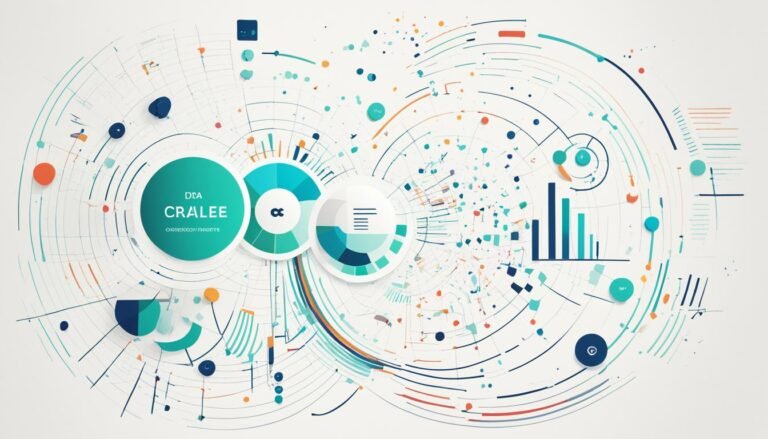Critical Thinking: A Must-Have Skill in a Data-Driven Workplace
Today, working fast and using data is the norm in many jobs. This makes thinking critically very important. Critical thinking is needed in all fields because we use data a lot to make choices.
This skill helps people tackle tough problems. It lets them find the most important info and make smart decisions. Instead of just believing things, critical thinkers ask questions and look at many options before choosing.
Today’s employers highly value critical thinking. Studies show that skills like being good at analyzing, being creative, and adapting are key. Developing critical thinking helps you keep up with the job market trends.
This article will explain more about why critical thinking matters now. We will talk about how it helps at work and why it’s important for getting ahead in your career.
Key Takeaways:
- Critical thinking is a vital skill for effective decision-making in a data-driven workplace.
- It involves analyzing, evaluating, and synthesizing information to make well-informed choices.
- Cultivating critical thinking skills is crucial for professional growth and staying competitive in the job market.
- Employers are increasingly seeking individuals with strong critical thinking abilities.
- Investing in critical thinking skills enhances problem-solving, decision-making, and communication.
The Importance of Critical Thinking in Today’s Workplace
Rapid changes in technology, global connections, and shaky economies bring tough issues for companies. Today, being able to think critically is crucial.
Companies gather huge amounts of data now, making decision-making hard. Critical thinking helps us deal with this and make smart choices. It lets people review info, compare choices, and see things from different angles.
With critical thinking, we can leave out guesses and personal opinions and use real, trustworthy data to decide. Organizations benefit a lot when choices are backed by solid proof and careful thought.
Critical thinking helps spot risks early and solve problems before they grow. By deeply examining info, workers can figure out why problems happen and come up with new fixes.
If we mix data and critical thinking, companies can change and grow fast. Using info for decisions, along with solid thinking to understand it, helps make choices that lead to success.
Today’s job market values critical thinking a lot. Employers want people who can face tough issues, check data, and choose wisely. Developing critical thinking in a team can create a culture of new ideas, quick responses, and always getting better.
The Role of Critical Thinking in Decision Making
Decision-making is where critical thinking really stands out. It lets us look at facts without bias, so our choices are clear. This makes sure we pick options that support what our organization is trying to do.
Critical thinking also boosts how we solve problems. Skilled thinkers can dig into a problem’s core, weigh different fixes, and come up with unique solutions. These skills help tackle issues that might otherwise be hard to deal with.
Companies that focus on building critical thinking in their teams see big benefits. A team that thinks critically makes decisions faster and more strategically. This boosts the company’s success as a whole.
Critical Thinking and Problem Solving
In today’s world, being able to think critically is very important. It helps us solve problems in our jobs and lives. Critical thinking lets us dive deep into issues, find their main cause, and come up with new ideas to fix them. This way of thinking helps us look at problems logically, checking various angles and ideas. This leads to better solutions and success for all.
Analytical thinking is key in critical thinking. It means looking at a problem step by step and studying all its parts. By doing this, we start to see hidden patterns and connections. This is how we come up with good solutions. People good at analytical thinking are pros at collecting and looking at data, researching, and making decisions based on facts.
Critical thinking also means we don’t just look at problems one way. We consider many points of view and question what we think we know. By doing this, we see the whole picture of a problem. This lets us create solutions that work for everybody involved.
“The essence of critical thinking is suspended judgement.” – Matthew Lipman
Developing Critical Thinking and Problem-Solving Skills
Getting better at critical thinking is something we can always work on. We can do this through learning, practice, and real-life experiences. Companies can help their workers develop these skills with training programs and by giving them challenges that mimic real work situations.
Working with others to solve problems is another great way to build these skills. When we share ideas and work together, we can come up with better solutions. This shows that many minds are often better than one.
Leaders have a big role to play in making a critical thinking environment. They need to set the right example, encourage creative thinking, and give feedback. This helps the whole team think more sharply and creatively.
Critical Thinking and Problem-Solving in Action
Let’s look at a real-life story to see the power of critical thinking:
| Problem | Traditional Approach | Critical Thinking Approach |
|---|---|---|
| A decrease in customer satisfaction | Blaming external factors and making assumptions | Identifying potential causes, analyzing data, and gathering feedback from customers |
| Result | Ineffective solutions and continued decline in customer satisfaction | Identification of specific issues, implementation of targeted solutions, and improvement in customer satisfaction |
In this case, using critical thinking helped the organization greatly. They looked deep into why customers were not happy. After gathering feedback and looking at data, they found key issues to fix. Their focused solutions made customers happier and the business better.
To sum up, critical thinking and problem-solving are essential in today’s jobs. With these skills, we can face tough challenges and make smart choices. Training and a work culture that supports thinking outside the box can lead to better problem-solving and success in the long run.
The Role of Critical Thinking in Decision Making
Critical thinking is key for making smart choices, especially at work. It means carefully looking at info and facts. This lets us avoid going with just what we assume. So, decisions are based on solid facts, boosting a company’s success and making customers happier.
By thinking critically, people use logic to check if info is solid. They look at various views and weigh the pros and cons. This helps them arrive at the best choice. They use their skills well, leading to objective decisions that others can trust.
In today’s data-heavy workplaces, critical thinking is more important than ever. It helps sift through all the data to find what’s important. This, in turn, aids in planning strategically and using resources better. Critical thinkers are essential for any organization’s success.
For example:
“In the marketing team, critical thinkers analyze data to know what customers want and what the market looks like. Then, they can decide on prices, how to position products, and how to market them to gain customers. This strategy boosts sales and keeps us ahead of competitors.”
The Benefits of Critical Thinking in Decision Making
There are many good things that come from using critical thinking in decisions:
- Improved problem-solving: Critical thinkers are great at finding and fixing complex issues, leading to innovative solutions.
- Informed decision-making: It means making choices based on solid facts, not just what we might like to think.
- Reduced risks: They’re good at spotting risks and figuring out how to lower them, leading to better choices.
- Increased efficiency: Critical thinking helps to set priorities right, use resources well, and improve how things are done.
- Enhanced collaboration: By listening and considering everyone’s ideas, critical thinkers help teams work better together.
In today’s world, being able to think critically is a big plus for any business. It means providing people with the right skills to understand and decide well. This boosts an organization’s chances of doing well in a competitive world.
| Impact of Critical Thinking in Decision Making | Benefits |
|---|---|
| Higher productivity | Employees make informed decisions efficiently, leading to increased productivity. |
| Better financial outcomes | Data-driven decision-making improves revenue generation and resource allocation. |
| Enhanced customer satisfaction | Informed decisions result in improved customer experiences and satisfaction. |
| Reduced errors | Well-analyzed decisions minimize mistakes and increase operational efficiency. |
Critical Thinking and Effective Communication
In today’s fast-paced world, good communication is key. But it’s not just about sharing information. Thinking critically when you talk is just as vital. It helps you break down and assess what you’re saying. This makes your communication clear and interesting to others.
People who think critically can handle complex ideas and share them clearly. They make sure to get to the important points. This makes their audience understand better. It works well in meetings, with clients, or even in emails. They make sure their message is clear and gets through.
Also, critical thinkers can look at different sides of an issue. They welcome new ideas, making team talks better. This leads to fresh solutions. Through good talk, they help ideas to grow and bring people closer.
Sharing ideas with others is easier when you think critically. Group work benefits a lot because of this. You can pick out what’s good and bad about various ideas. This leads to better choices for the team.
“Critical thinking is key for talking well. It helps people speak clearly, listen, and have good chats.”
Critical thinking also helps to avoid fights at work. It lets you spot where people might not get what you’re saying. Then, you can fix it before it causes trouble. Talking clearly truly matters here.
Talking well means both listening and responding thoughtfully. Critical thinkers are great at both. They don’t just hear; they understand. Then, they share ideas and ask smart questions. This makes the team work better together.

The Benefits of Critical Thinking and Effective Communication:
- Promotes clear and concise communication
- Enhances collaboration and teamwork
- Reduces misunderstandings and conflicts
- Fosters innovation and creativity
- Strengthens relationships and rapport
Critical Thinking and Effective Communication: A Winning Combination
Mixing critical thinking with great talking lets individuals shine at work. They speak up with confidence and hear others carefully. They are key to making teamwork and new ideas happen. This helps them build good, trusting relationships at work.
Effective communication is at the heart of successful collaboration, and critical thinking is the driving force behind it.
Investing in Critical Thinking Skills
Today, businesses understand the key role of critical thinking. It’s vital in a world where data guides decisions. Through training and skill programs, companies help their teams think better.
Critical thinking isn’t just about solving problems. It involves looking at info, judging its importance, and making smart choices. This skill is crucial in a fast and complex business world.
“Critical thinking is the key to unlocking innovative ideas and driving effective decision-making in the workplace.”
The Benefits of Workplace Training
Training that sharpens critical thinking brings a lot of perks. It makes workers smarter and the work they do better. This means smoother work days and stronger team efforts.
Such programs also inspire new ways of thinking. Workers start challenging old ways and offer new solutions. This keeps the company on its toes and ahead of the game.
Developing Critical Thinking Skills Through Training
Good training gives a broad set of tools for smart thinking. It includes logic, problem-solving steps, and how to find solid facts. There’s also hands-on practice like case studies and team talks.
Using critical thinking every day boosts its power. If folks regularly question ideas and share different views, it becomes a team habit.
The Impact on the Workforce
With better critical thinking, workers stand out as independent thinkers. They can sift through data, pick what’s important, and decide with confidence. This makes job roles stronger and boosts team efforts.
Companies that focus on critical thinking see big changes. Their teams are always improving, innovating, and making smart moves. It all starts with proper training.
*Image depicts employees engaged in critical thinking activities during workplace training.*
The Impact of Data in a Data-Driven Workplace
Today, data plays a crucial role in our workplaces. Employers see the value in staff who can understand and analyze data. Such skills help people make smarter choices and plan for the future in business.
Knowing how to use data makes teams more successful. It lets them learn about their customers better and understand their own operations. This way, they can find new chances, lower risks, and make their business work better.
With data guiding decisions, leaders can choose paths that make the most sense. This approach helps in uncertain times, making their moves more certain and less risky.
How Data Drives Decision Making
Data is like a solid bedrock for making decisions. It gives clues and patterns that are hard to see without the right tools. This makes decisions more solid, based on facts rather than guesses.
“Data-driven decision-making takes the guesswork out of the equation and empowers organizations to make informed choices with confidence.” – John Smith, Data Analyst
This method also makes teams more honest and ready to explain their decisions. When choices come from data, they are fair game for anyone to check. This trust between team members helps the whole organization work better.
Being led by data lets organizations plan ahead instead of just reacting to problems. By keeping an eye on the right numbers, they spot trends early. This helps them be ready for what’s next, always a step ahead.
The Role of Data Literacy
Being literate in data means you know how to use it well. In any job nowadays, being able to work with data is a big plus. It means you can help make better choices and grow the business.
Offering courses in data for workers is very important. They teach the skills needed to pull insights from data and share them. This makes using data part of everyday work, boosting the whole team’s efforts.
The Benefits of a Data-Driven Workplace
Switching to a data-focused way of working has lots of pluses:
- It makes decisions clearer and better.
- Teams work smoother, getting more done.
- Customers get what they want because their needs are understood.
- Knowing the market helps you get ahead of others.
- It makes finding new ways to grow and innovate easier.
The way businesses use data is always changing. But adapting to these changes means being ready for whatever comes next. It’s a key to doing well in today’s business world.
The Importance of Data Literacy in the Workplace
Understanding data is really important at work now. We need to be able to look at data and make smart choices. Yet, a lot of workers don’t know how to use the data around them. This can hold them back from helping their workplace succeed.
“Data is the new oil.”
– Clive Humby
Clive Humby says data is like oil for today’s world. Just like oil helped in the past, data is crucial for the digital age. Businesses that understand and use data well have a big head start.
Data literacy is more than reading graphs. It involves knowing how to find, check, understand, and share data well. When people are good at this, they can lead in making smart moves, see trends, and offer good ideas for the future.
But, it’s not just for tech people. Anyone in marketing, finance, HR, and more benefits from knowing about data. When everyone in a company is data literate, big choices are made better with data.
Benefits of Data Literacy
Being good with data has a lot of benefits:
- It helps workers make choices based on facts, leading to better results.
- They can use data to do jobs better and find ways to improve.
- Understanding data leads to spotting patterns and solving hard problems.
- It helps teams work better together by sharing insights backed by data.
Helping workers get better with data is smart for any company. It lets them make the most of their information. This way, everyone learns to use data well in their work.
Data literacy opens doors to new ideas and solves tough problems. It’s key for anyone who wants to help their workplace grow and innovate using data.
| Benefits of Data Literacy |
|---|
| Enhanced Decision Making |
| Increased Efficiency |
| Improved Problem Solving |
| Enhanced Collaboration |
Conclusion
Critical thinking is crucial today. The world relies on data and technology more than ever. To stay ahead, companies need workers to analyze data, make smart choices, and solve problems.
Fostering critical thinking in a workplace helps everyone. It lets workers look at facts clearly, question what they know, and see various angles. This process improves decision-making and sparks new ideas. Critical thinkers can spot trends, find hidden facts, and use data for better business plans.
Businesses face tough competition. They must see the importance of critical thinking. Giving employees the right skills helps companies lead, respond to changes, and find new chances. By investing in critical thinking, companies set themselves up for future success.








